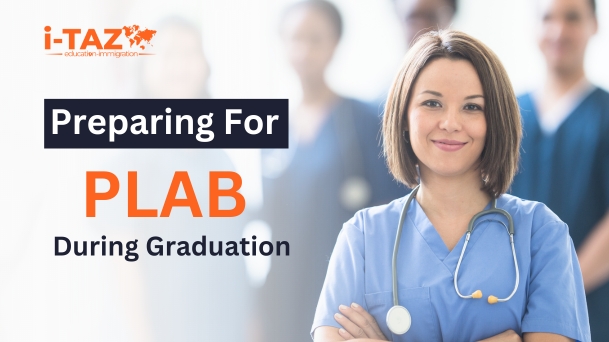Preparing for the Professional and Linguistic Assessments Board (PLAB) while still in medical school is an excellent strategy for international medical graduates (IMGs) aiming to practice in the UK. It allows you to get a head start in your career by leveraging the knowledge and clinical skills you’re already developing during your studies. However, balancing PLAB preparation with academic responsibilities can be challenging, as you’ll need to manage your time effectively while ensuring you excel in both your university exams and the PLAB.

What is PLAB?
The PLAB exam, administered by the General Medical Council (GMC) in the UK, evaluates whether international medical graduates have the necessary skills and knowledge to work as doctors in the UK. It consists of two parts:
1. PLAB 1: A written, multiple-choice exam with 180 questions over 3 hours.
2.PLAB 2: An objective structured clinical examination (OSCE) that tests practical skills.
Why Prepare for PLAB During Graduation?
- Time Efficiency: Preparing for PLAB during your final years of medical school allows you to start your medical career in the UK sooner after graduation.
- Retention of Knowledge: While still immersed in your studies, your clinical knowledge is fresh, making it easier to retain and apply information during PLAB preparation.
- Career Advancement: Early PLAB preparation means you can gain UK experience sooner, opening doors to better job opportunities and postgraduate training.
PLAB Exam Eligibility for Students
Students nearing the completion of their medical degree can begin preparing for PLAB 1, provided they meet the eligibility criteria:
Medical Qualification: You must have completed at least a year of clinical rotations in your home country.
- English Proficiency: You’ll need to meet the GMC’s English language requirement by taking the IELTS (minimum overall score of 7.5) or the OET (minimum grade B in each module).
PLAB Exam Eligibility for Students
Students nearing the completion of their medical degree can begin preparing for PLAB 1, provided they meet the eligibility criteria:
- Medical Qualification: You must have completed at least a year of clinical rotations in your home country.
- English Proficiency: You’ll need to meet the GMC’s English language requirement by taking the IELTS (minimum overall score of 7.5) or the OET (minimum grade B in each module).
How to Start Preparing for PLAB 1
1. Create a Study Plan
Allocate time each day to cover essential topics such as clinical medicine, surgery, pediatrics, and obstetrics. You should aim for a structured approach where you can cover the entire PLAB 1 syllabus in 3-6 months.
2. Leverage Online Resources
Several platforms offer PLAB 1 preparation courses, mock tests, and question banks. The most popular ones include PLABable, Pastest, and MedRevision. Using these resources helps you get familiar with the exam pattern and improve your time management skills.
3. Join Study Groups
Collaborating with peers who are also preparing for PLAB during medical school can be highly beneficial. Study groups allow you to discuss complex topics, share resources, and keep each other motivated.
4. Practice Time Management
The PLAB 1 exam requires quick thinking and precision. Simulate exam conditions by timing yourself during practice tests to improve your speed and accuracy.

Balancing Medical School and PLAB Preparation
Balancing PLAB preparation with your academic responsibilities can be daunting. Here’s how you can manage both:
Prioritize: Allocate more time to PLAB study during less intense academic periods, such as between semesters or during holidays.
Daily Mini-Study Sessions: Dedicate at least 1-2 hours daily to PLAB prep without neglecting your schoolwork. Consistency is key.
Integrate Learning: Use your clinical rotations and lectures to reinforce your PLAB studies. For example, while in pediatrics, focus on revising pediatric topics for PLAB 1.
Preparing for PLAB 2 During Internship
PLAB 2 is a practical exam that assesses your ability to apply clinical knowledge in real-world scenarios. Here’s how you can start preparing during your internship or after PLAB 1:
- Clinical Skills: Focus on developing clinical skills, such as history taking, patient communication, and examination techniques. These are vital for the OSCE stations in PLAB 2.
- Mock Exams: Participate in mock PLAB 2 exams or OSCE practice sessions to gain confidence.
- Study Groups: Continue with study groups or join new ones focused on PLAB 2 prep. Collaboration can enhance your practical skills through peer feedback.
The Role of i-Taz in Your PLAB Journey
At i-Taz, we understand that preparing for PLAB while still in medical school can be overwhelming. Our expert visa consultancy services help you streamline the process, from exam registration to immigration assistance, ensuring you can focus on your studies and PLAB preparation. With 10+ years of experience in helping IMGs navigate their path to the UK, i-Taz is your trusted partner for PLAB success.
Conclusion
Preparing for PLAB during graduation offers numerous benefits, including saving time and enhancing career prospects. By following a structured study plan, leveraging online resources, and balancing your academic responsibilities, you can set yourself up for success. Whether you’re tackling PLAB 1 or PLAB 2, the right preparation will enable you to achieve your goal of practicing medicine in the UK.









